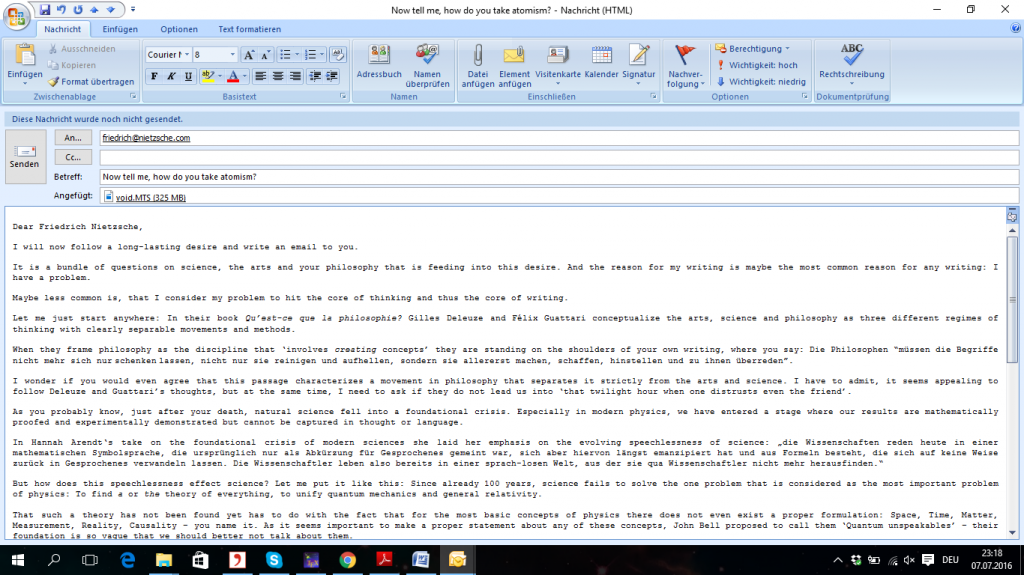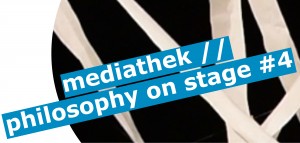Nietzsche and Physics // Lecture-Text
Lecture in the frame of Early Readings by Tanja Traxler [CV]
friedrich@nietzsche.com
Subject: Now tell me, how do you take atomism?
Attachments: void.MTS (325 MB)
Dear Friedrich Nietzsche,
I will now follow a long-lasting desire and write an email to you.
It is a bundle of questions on science, the arts and your philosophy that is feeding into this desire. And the reason for my writing is maybe the most common reason for any writing: I have a problem.
Maybe less common is, that I consider my problem to hit the core of thinking and thus the core of writing.
Let me just start anywhere: In their book Qu’est-ce que la philosophie? Gilles Deleuze and Félix Guattari conceptualize the arts, science and philosophy as three different regimes of thinking with clearly separable movements and methods.
When they frame philosophy as the discipline that ‘involves creating concepts’ they are standing on the shoulders of your own writing, where you say: Die Philosophen “müssen die Begriffe nicht mehr sich nur schenken lassen, nicht nur sie reinigen und aufhellen, sondern sie allererst machen, schaffen, hinstellen und zu ihnen überreden”.
I wonder if you would even agree that this passage characterizes a movement in philosophy that separates it strictly from the arts and science. I have to admit, it seems appealing to follow Deleuze and Guattari’s thoughts, but at the same time, I need to ask if they do not lead us into ‘that twilight hour when one distrusts even the friend’.
As you probably know, just after your death, natural science fell into a foundational crisis. Especially in modern physics, we have entered a stage where our results are mathematically proofed and experimentally demonstrated but cannot be captured in thought or language.
In Hannah Arendt‘s take on the foundational crisis of modern sciences she laid her emphasis on the evolving speechlessness of science: „die Wissenschaften reden heute in einer mathematischen Symbolsprache, die ursprünglich nur als Abkürzung für Gesprochenes gemeint war, sich aber hiervon längst emanzipiert hat und aus Formeln besteht, die sich auf keine Weise zurück in Gesprochenes verwandeln lassen. Die Wissenschaftler leben also bereits in einer sprach-losen Welt, aus der sie qua Wissenschaftler nicht mehr herausfinden.“
But how does this speechlessness effect science? Let me put it like this: Since already 100 years, science fails to solve the one problem that is considered as the most important problem of physics: To find a or the theory of everything, to unify quantum mechanics and general relativity.
That such a theory has not been found yet has to do with the fact that for the most basic concepts of physics there does not even exist a proper formulation: Space, Time, Matter, Measurement, Reality, Causality – you name it. As it seems important to make a proper statement about any of these concepts, John Bell proposed to call them ‘Quantum unspeakables’ – their foundation is so vague that we should better not talk about them.
Therefore, it seems that physics got trapped in its own narrow metaphysics and now it is unable to move forward.
If philosophy, science and the arts had to be separated once and for all, could there even be something like a philosophy of physics? Is any attempt to surpass the boundaries between philosophy and physics limited to the twilight, and is your work readable and only readable during this hour when you mistrust your friend?
To become a philosopher-physicist, it might be necessary to go beyond good and evil and what can be found in Beyond Good and Evil is a reference to a thinker who is said to be of crucial importance for your thinking: Giuseppe Boscovich. While Boscovich might have led you to some of your central concepts, like will to power or eternal recurrence, to me it seems particularly interesting how you take one idea to which modern physics owes an important credit to Boscovich: atomism.
In Boscovich’s theory, atoms are indivisible points without extension. In modern science language, Boscovich’s atoms come close to mass points that are surrounded by fields of force. The difficulty that goes along with this concept is the same that accompanies modern atomic theory: it demands from us to go beyond the senses and perception. As far as I understand, in this perspective, forces are much more fundamental than matter – an attack against a materialistic atomism á la Isaac Newton that you, Friedrich, embrace enthusiastically: ‘Was die materialistische Atomistik betrifft: so gehört dieselbe zu den bestwiderlegten Dingen, die es giebt; […] Dank vorerst jenem Polen Boscovich, der, mitsammt dem Polen Kopernicus, bisher der grösste und siegreichste Gegner des Augenscheins war. Während nämlich Kopernicus uns überredet hat zu glauben, wider alle Sinne, dass die Erde nicht fest steht, lehrte Boscovich dem Glauben an das Letzte, was von der Erde „feststand“, abschwören, dem Glauben an den „Stoff“, an die „Materie“, an das Erdenrest- und Klümpchen-Atom: es war der grösste Triumpf über die Sinne, der bisher auf Erden errungen worden war.’
But this does not mean that you reject atomism altogether. For example, you follow Boscovich‘s atomic point particle theory when developing your Zeitatomenlehre: ‘Es ist möglich, 1) die vorhandene Welt auf punktuelle Raumatomistik zurückzuführen, 2) diese wieder auf Zeitatomistik zurückzuführen 3) die Zeitatomistik fällt endlich zusammen mit einer Empfindungslehre.’
But can it be all that easy that there is an evil Newtonian atom theory and a good Boscovichian atom theory? How about modern concepts of the atom that go beyond pure massy lumps and mass-point models?
In my understanding, the horizon of science is already befallen by a radical openness in thinking that is entirely new to science and not yet realized in the community of the scientists. For further information on that please check out the video attached.
Friedrich, how would you conceive of contemporary concepts of matter and vacuum respecting the fundamental character of fields and forces but also the extended quality of matter? What kind of atoms do we need in order to achieve a gay physics? Speaking with Goethe, let me ask you: Friedrich, now tell me, how do you take atomism?
I hope we get the chance to chat about that soon.
All the best,
Tanja
IMPRESSUM
Led by Arno Böhler, the PEEK-Projekt „Artist Philosophers. Philosophy AS Arts-Based-Research“ [AR275-G21] is funded by the Austrian Science Fund (FWF) as part of the programme for artistic development and investigation (PEEK). Research location: University of Applied Arts Vienna. Brought about in national and international cooperation with: Jens Badura (HdK Zürich), Laura Cull (University of Surrey), Susanne Valerie Granzer (Universität für Musik und darstellende Kunst Wien/Max Reinhardt Seminar), Walter Heun (Tanzquartier Wien), Alice Lagaay (Zeppelin Universität Friedrichshafen). Postdoc: Elisabeth Schäfer (University of Applied Arts Vienna). The lecture series was produced in collaboration with: Institut für Philosophie Universität Wien, University of Applied Arts Vienna [Arno Böhler] and Institut für Theater- Film- und Medienwissenschaft der Universität Wien [Krassimira Kruschkova].
Our mailing address is:
FWF PEEK-Project „Artist-Philosophers. Philosophy AS Arts-Based-Research“ [AR 275-G21]
Universität für angewandte Kunst
Oskar-Kokoschka-Platz 2
A-1010 Wien
Subscribe to our mailing list
Comments are closed.


